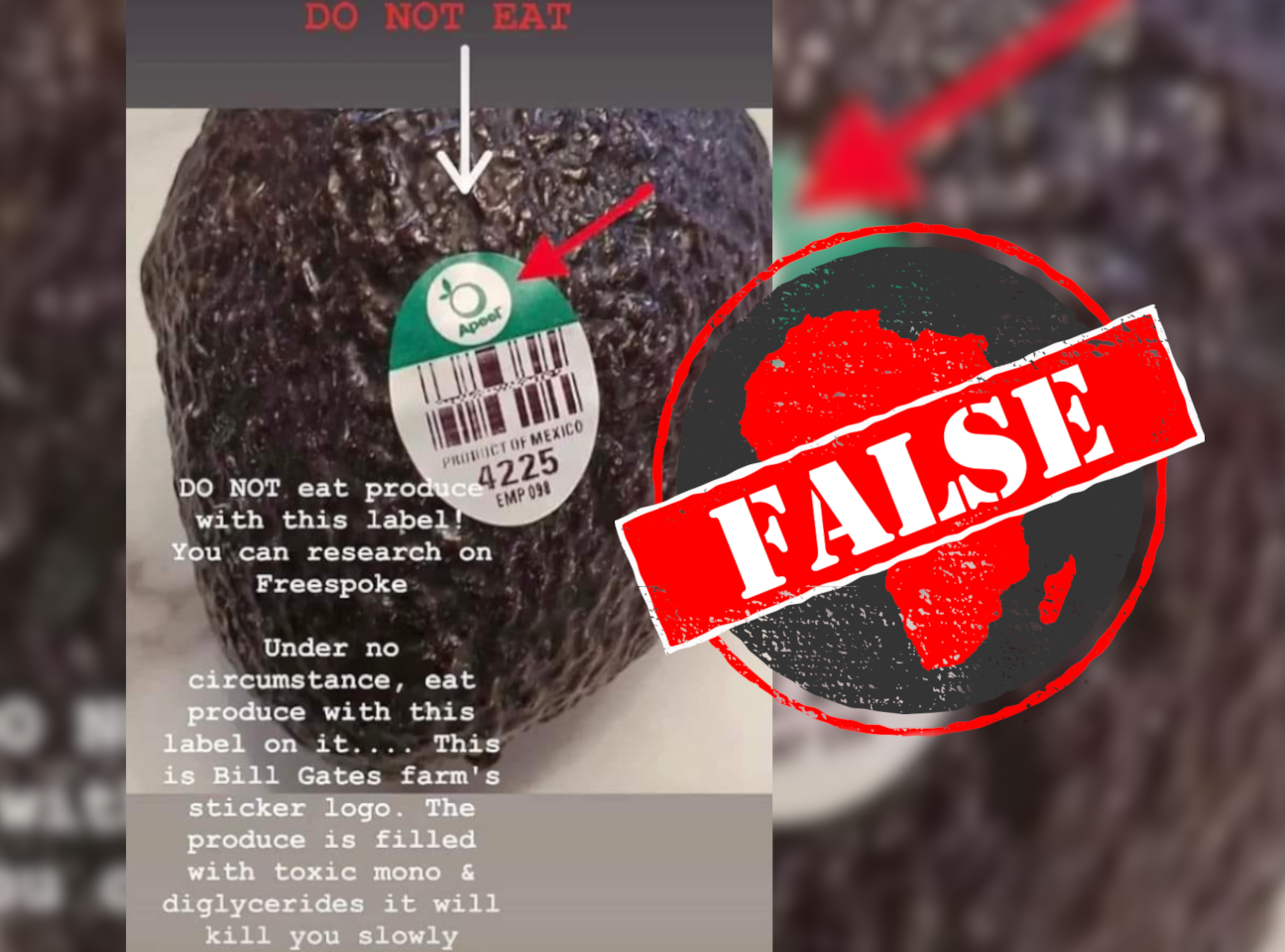IN SHORT: Facebook posts have claimed that produce labelled “Apeel” should not be eaten. But Apeel’s plant-based coating is safe and “designed to be consumed”.
Messages are doing the rounds on Facebook in South Africa and Nigeria, telling people not to buy fruit labelled “Apeel”.
One of the claims includes a graphic that says these products are filled with “toxic mono & diglycerides” and that it will “kill you slowly”.
Other similar posts claim the “safety data sheet” of the company admits the produce may cause harm, and appear to quote from it:
“APEEL Hazard statements H318 Causes serious eye damage. H317 May cause an allergic skin reaction. H412 Harmful to aquatic life with long lasting effects. Precautionary statements P280 Wear protective gloves/ protective clothing/ eye protection/ face protection. P302+P352 IF ON SKIN: Wash with plenty of water.”
The graphic also says the fruits are a product of Bill Gates’s farm.
Bill Gates is the billionaire co-founder of Microsoft and co-chair of the Bill & Melinda Gates Foundation. (Disclaimer: Funding from the Bill & Melinda Gates Foundation made up 26% of Africa Check’s income in 2021.)
Apeel Sciences is a real company. It produces an edible “peel” meant to protect fresh produce. But the produce will not “kill you slowly” and it is not grown on farms owned by Gates. Here are the facts.

‘Apeel’s plant-based protection … slows the rate of oxidation and moisture loss’
Apeel Sciences was founded in 2012 and is based in Goleta, a city in the US state of California.
The company aims to prevent food waste by creating produce that lasts longer and is of better quality.
“Apeel’s plant-based protection adds an extra ‘peel’ to slow the rate of oxidation and moisture loss,” their website says.
But how does it work?
Apeel Sciences has created a product called Edipeel, which is a thin and edible coating meant to mimic the functions of a fruit’s cuticle.
The cuticle is the outermost layer found in the peel of a fruit or vegetable.
The Edipeel coating is plant-derived and “designed to be consumed”, according to the company.
“Apeel is composed entirely of purified monoglycerides and diglycerides, edible compounds that can be found in a variety of foods,” Apeel Sciences says.
Monoglycerides and diglycerides are prepared from fats or oils derived from edible sources and have been generally recognised as safe by the US Food and Drug Administration (FDA).
The Edipeel product has been approved by the FDA and the World Health Organization.
Apeel Sciences has also been backed by the World Economic Forum and the World Food Programme.
The produce coated by Apeel Sciences’s Edipeel is safe to eat and there is no evidence it will “kill you slowly”.
30-month grant from Gates Foundation in 2015
One of the posts claims that Apeel Sciences is the logo of a farm owned by Gates. This is only the latest in a long line of misinformation about Gates, ranging from his involvement in vaccines to food supplies.
Apeel Sciences does appear on the Gates Foundation website, but not because Gates owns the company.
In August 2015, Apeel Sciences received a 30-month grant from the Gates Foundation for US$985,000 (around R12,5 million at the time).
This had helped Apeel Sciences raise a total of $110 million in funding, from other investors, by 2018.
Safety sheet for all-purpose cleaner with similar name
Some of the posts on Facebook also claim that the Apeel Sciences produce could cause harm, according to a “safety data sheet”.
We searched for the text in the claim, apparently quoted from the safety sheet, and found that this safety information was created for another brand with a similar name.
Evans Vanodine Apeel brand is an orange multi-purpose cleaner and degreaser. The safety information provided in the Facebook posts is for the cleaning product, not anything originated with Apeel Sciences.
There is no evidence that the product developed by the company is harmful. The company received a grant from the Gates Foundation in 2015, but is otherwise not connected to the foundation or Bill Gates.
Republish our content for free
For publishers: what to do if your post is rated false
A fact-checker has rated your Facebook or Instagram post as “false”, “altered”, “partly false” or “missing context”. This could have serious consequences. What do you do?
Click on our guide for the steps you should follow.
Publishers guideAfrica Check teams up with Facebook
Africa Check is a partner in Meta's third-party fact-checking programme to help stop the spread of false information on social media.
The content we rate as “false” will be downgraded on Facebook and Instagram. This means fewer people will see it.
You can also help identify false information on Facebook. This guide explains how.


Add new comment